仁爱版八年级英语上册动词用法的形式归纳
仁爱版英语八年级上册知识点归纳

仁爱版英语八年级上册知识点归纳一、Unit 11.重点词汇:festival, custom, occasion, traditional, celebrate, annual, superstition2.语法:一般现在时和现在进行时3.重点句型:How do you celebrate the Spring Festival? I usually clean the house and have a big family dinner.二、Unit 21.重点词汇:adventure, explore, wander, journey, destination, route, scenery2.语法:一般过去时和过去进行时3.重点句型:We visited the Great Wall and took many photos.三、Unit 31.重点词汇:charity, donation, organization, fund, poverty, volunteer, campaign2.语法:情态动词can, could, may, might表请求、允许、建议、批准等3.重点句型:Can I join the charity bike ride? Sure, you can.四、Unit 41.重点词汇:weather forecast, hurricane, tornado, thunderstorm, lightning, disaster, rescue2.语法:虚拟语气3.重点句型:If I were you, I would take an umbrella because it may rain this afternoon.五、Unit 51.重点词汇:talent show, contestant, judge, round, applause, champion, performance2.语法:感叹句3.重点句型:What a wonderful performance!六、Unit 61.重点词汇:hobby, furniture, instrument, recipe, exhibition, display, masterpiece2.语法:动词不定式3.重点句型:She likes to play the piano in her free time.七、Unit 71.重点词汇:environment, pollution, recycle, global warming, carbon dioxide, emissions, alternative2.语法:虚拟语气3.重点句型:If we don't take action now, the environment will bein great danger.八、Unit 81.重点词汇:vacation, destination, souvenir, guidebook, sightseeing, journey, amodation2.语法:宾语从句3.重点句型:I want to know where you are going for vacation.以上是仁爱版英语八年级上册的知识点归纳。
仁爱版英语八年级上知识点归纳

仁爱版英语八年级上知识点归纳八年级上册的英语教材是中学生英语学习的重要阶段,学习内容涵盖了语法、词汇、听说读写等各个方面的知识。
下面将对仁爱版英语八年级上册的知识点进行归纳和总结,以帮助同学们更好地学习和复习。
一、语法知识点1. 一般现在时:描述经常性的动作或现实情况。
例如:I usually go to school by bus.2. 一般过去时:描述过去某个时间发生的动作或存在的状况。
例如:He played football yesterday.3. 现在进行时:表示现阶段正在进行的动作。
例如:She is watching TV now.4. 一般将来时:表示将来某个时间或某个动作会发生。
例如:I will go to the park tomorrow.5. 情态动词can:表示能力、许可和请求等。
例如:I can play the piano.6. 情态动词should:表示建议、责任和必要等。
例如:You should listen to your parents.7. 动词不定式:表示目的、愿望和计划等。
例如:I want to be a teacher.8. 动词的-ing形式:作主语、宾语、表语和状语等。
例如:Swimming is my favorite sport.二、词汇知识点1. 数字:zero, one, two, three, four, five, six, seven, eight, nine, ten等。
2. 颜色:red, blue, green, yellow, black, white, pink等。
3. 学科:math, English, Chinese, history, geography, PE等。
4. 动物:dog, cat, bird, fish, tiger, panda, monkey, elephant等。
5. 食物:noodles, rice, bread, milk, juice, apple, banana等。
仁爱版八年级上册英语知识点总结(最新最全)

八年级上英语语法1)IeaVe的用法1.“leave+地点”表示“离开某地”。
例如:When did you IeaVe Shanghai?你什么时候离开上海的?2.“leave for+地点”表示“动身去某地”。
例如:NeXt Friday, AIiCe is IeaVing for London. 下周五,爱丽斯要去伦敦了。
3.“leave+地点+for+地点”表示“离开某地去某地"。
例如:Why are you IeaVing Shanghai for Beijing?你为什么要离开上海去北京?2)情态动词ShOUld “应该”学会使用ShOUld作为情态动词用,常常表示意外、惊奇、不能理解等,有“竟会”的意思,例如: HOw ShOUld I know?我怎么知道?Why ShOUId you be SO Iate today?你今天为什么来得这么晚?ShOUld有时表示应当做或发生的事,例如:We ShOUId help each other.我们应当互相帮助。
我们在使用时要注意以下几点:1.用于表示"应该”或“不应该”的概念。
此时常指长辈教导或责备晚辈。
例如:YOU ShOUld be here With CIean hands.你应该把手洗干净了再来。
2.用于提出意见劝导别人。
例如:YOU ShOUICI go to the doctor if you feel ill.如果你感觉不舒服,你最好去看医生。
3.用于表示可能性。
S hoUICl的这一用法是考试中常常出现的考点之一。
例如:We ShOUld arrive by SUPPer time.我们在晚饭前就能到了。
She ShOUId be here any moment.她随时都可能来。
31.What与WhiCh都是疑问代词,都可以指人或事物,但是What仅用来询问职业。
如:Whatis your father? 你父亲是干什么的?该句相当于:What does your father do?What is your father'S job?WhiCh指代的是特定范围内的某一个人。
最新仁爱版英语八年级上册语法汇总
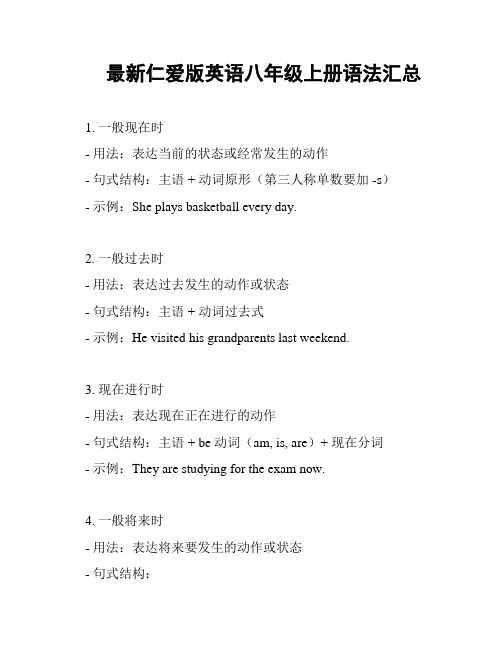
最新仁爱版英语八年级上册语法汇总
1. 一般现在时
- 用法:表达当前的状态或经常发生的动作
- 句式结构:主语 + 动词原形(第三人称单数要加 -s)
- 示例:She plays basketball every day.
2. 一般过去时
- 用法:表达过去发生的动作或状态
- 句式结构:主语 + 动词过去式
- 示例:He visited his grandparents last weekend.
3. 现在进行时
- 用法:表达现在正在进行的动作
- 句式结构:主语 + be 动词(am, is, are)+ 现在分词
- 示例:They are studying for the exam now.
4. 一般将来时
- 用法:表达将来要发生的动作或状态
- 句式结构:
- 主语 + will + 动词原形(肯定句)
- 主语 + won't + 动词原形(否定句)
- Will + 主语 + 动词原形?(疑问句)
- 示例:I will finish my homework later.
5. 现在完成时
- 用法:表达过去发生的但与现在相关的动作或状态
- 句式结构:主语 + have/has + 过去分词
- 示例:She has already eaten lunch.
以上是最新仁爱版英语八年级上册的语法汇总。
语法知识的掌握对于学习英语非常重要,希望以上内容能帮助你更好地理解和应用语法规则。
如果有任何疑问,请随时向我提问。
新仁爱英语八年级上下册语法考点大全
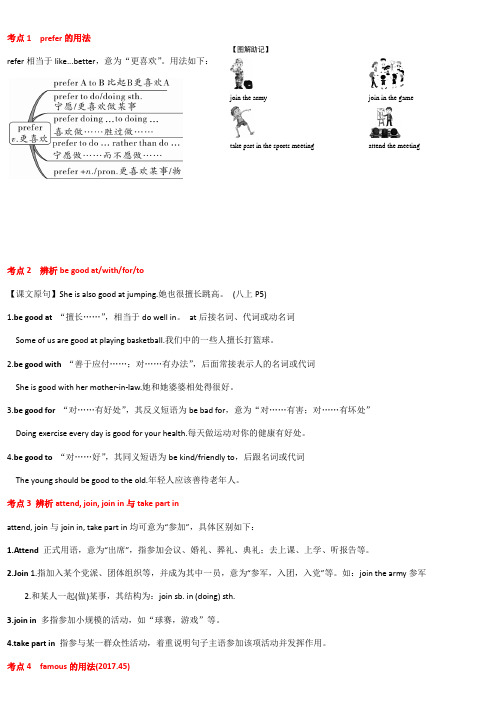
考点1 prefer 的用法refer 相当于like...better ,意为“更喜欢”。
用法如下:考点2 辨析be good at/with/for/to【课文原句】She is also good at jumping.她也很擅长跳高。
(八上P5)1.be good at “擅长……”,相当于do well in 。
at 后接名词、代词或动名词Some of us are good at playing basketball.我们中的一些人擅长打篮球。
2.be good with “善于应付……;对……有办法”,后面常接表示人的名词或代词She is good with her motherinlaw.她和她婆婆相处得很好。
3.be good for “对……有好处”,其反义短语为be bad for ,意为“对……有害;对……有坏处”Doing exercise every day is good for your health.每天做运动对你的健康有好处。
4.be good to “对……好”,其同义短语为be kind/friendly to ,后跟名词或代词The young should be good to the old.年轻人应该善待老年人。
考点3 辨析attend, join, join in 与take part inattend, join 与join in, take part in 均可意为“参加”,具体区别如下:1.Attend 正式用语,意为“出席”,指参加会议、婚礼、葬礼、典礼;去上课、上学、听报告等。
2.Join 1.指加入某个党派、团体组织等,并成为其中一员,意为“参军,入团,入党”等。
如:join the army 参军2.和某人一起(做)某事,其结构为:join sb. in (doing) sth.3.join in 多指参加小规模的活动,如“球赛,游戏”等。
英语八年级上册语法知识点仁爱版

英语八年级上册语法知识点仁爱版一、一般现在时1. 概念:表示经常发生的动作或存在的状态。
2. 构成:动词原形或第三人称单数形式。
3. 用法:表示经常性、习惯性的动作或存在的状态,也表示现在的特征或状态。
如:He often helps his mother do the housework. 他经常帮他妈妈做家务。
4. 特殊用法:表示主语具备的性格和能力,也可以表示客观事实或普遍真理。
如:She can sing this song in English. 她能用英语唱这首歌。
二、现在进行时1. 概念:表示正在进行的动作或存在的状态。
2. 构成:be动词(am/is/are)+动词的现在分词形式(-ing)。
3. 用法:表示正在进行的动作或存在的状态,强调的是正在发生的事情。
如:They are studying in the classroom. 他们在教室里学习。
4. 特殊用法:表示将来发生的动作,也可以表示过去发生的动作。
如:He is coming to see you tomorrow. 他明天要来看你。
(表示将来) They were having a meeting at this time yesterday. 昨天这个时候他们在开会。
(表示过去)三、现在完成时1. 概念:表示已经完成的动作或存在的状态,对现在产生的影响或结果。
2. 构成:have/has + 过去分词。
3. 用法:表示过去发生的动作已经完成,对现在产生的影响或结果。
如:I have finished my homework. 我已经完成了我的作业。
4. 特殊用法:可以表示发生在过去的动作延续到现在,也可以表示过去发生的动作与现在的状态有关。
如:He has lived here since 2000. 他从2000年就住在这里了。
(表示过去的动作延续到现在)They have been married for five years. 他们结婚已经五年了。
最新仁爱版八年级英语上册Unittopic2知识语法点总结
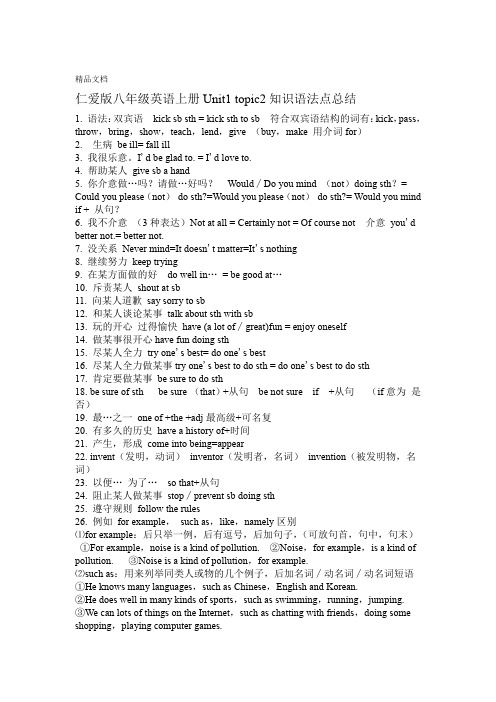
精品文档仁爱版八年级英语上册Unit1 topic2知识语法点总结1.语法:双宾语kick sb sth = kick sth to sb 符合双宾语结构的词有:kick,pass,throw,bring,show,teach,lend,give (buy,make 用介词for)2.生病be ill= fall ill3.我很乐意。
I'd be glad to. = I'd love to.4.帮助某人give sb a hand5.你介意做…吗?请做…好吗?Would∕Do you mind (not)doing sth?= Could you please(not)do sth?=Would you please(not)do sth?= Would you mind if + 从句?6.我不介意(3种表达)Not at all = Certainly not = Of course not 介意you'd better not.= better not.7.没关系Never mind=It doesn't matter=It's nothing8.继续努力keep trying9.在某方面做的好do well in…= be good at…10. 斥责某人shout at sb11. 向某人道歉say sorry to sb12. 和某人谈论某事talk about sth with sb13. 玩的开心过得愉快have (a lot of∕great)fun = enjoy oneself14. 做某事很开心have fun doing sth15. 尽某人全力try one's best= do one's best16. 尽某人全力做某事try one's best to do sth = do one's best to do sth17. 肯定要做某事be sure to do sth18. be sure of sth be sure (that)+从句be not sure if +从句(if意为是否)19. 最…之一one of +the +adj最高级+可名复20. 有多久的历史have a history of+时间21. 产生,形成come into being=appear22. invent(发明,动词)inventor(发明者,名词)invention(被发明物,名词)23. 以便…为了…so that+从句24. 阻止某人做某事stop∕prevent sb doing sth25. 遵守规则follow the rules26. 例如for example,such as,like,namely区别⑴for example:后只举一例,后有逗号,后加句子,(可放句首,句中,句末)①For example,noise is a kind of pollution. ②Noise,for example,is a kind of pollution. ③Noise is a kind of pollution,for example.⑵such as:用来列举同类人或物的几个例子,后加名词∕动名词∕动名词短语①He knows many languages,such as Chinese,English and Korean.②He does well in many kinds of sports,such as swimming,running,jumping.③We can lots of things on the Internet,such as chatting with friends,doing some shopping,playing computer games.精品文档.精品文档⑶Like:与such as用法一致⑷Namely:即,也就是。
初中英语 仁爱版八年级上册Unit1Topic1知识点
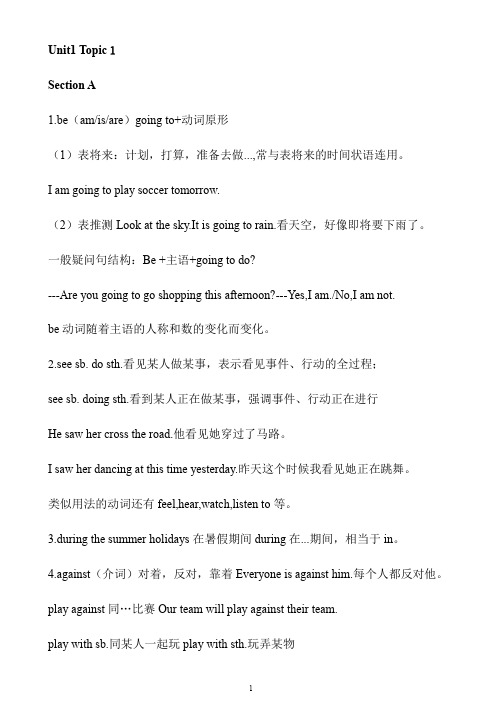
Unit1 Topic1Section A1.be(am/is/are)going to+动词原形(1)表将来:计划,打算,准备去做...,常与表将来的时间状语连用。
I am going to play soccer tomorrow.(2)表推测Look at the sky.It is going to rain.看天空,好像即将要下雨了。
一般疑问句结构:Be +主语+going to do?---Are you going to go shopping this afternoon?---Yes,I am./No,I am not.be动词随着主语的人称和数的变化而变化。
2.see sb. do sth.看见某人做某事,表示看见事件、行动的全过程;see sb. doing sth.看到某人正在做某事,强调事件、行动正在进行He saw her cross the road.他看见她穿过了马路。
I saw her dancing at this time yesterday.昨天这个时候我看见她正在跳舞。
类似用法的动词还有feel,hear,watch,listen to等。
3.during the summer holidays在暑假期间during在...期间,相当于in。
4.against(介词)对着,反对,靠着Everyone is against him.每个人都反对他。
play against同…比赛Our team will play against their team.play with sb.同某人一起玩play with sth.玩弄某物I often play with my friends. The cat is playing with a ball.against作为介词,还有“紧靠;倚”的意思。
Eg:Put the piano there,against the wall.把钢琴放在那,紧靠着墙。
仁爱英语八年级上册笔记

仁爱英语八年级上册笔记一、Unit 1 Playing Sports。
(一)重点单词。
1. almost.- 词性:副词,意为“几乎,差不多”。
例如:I almost missed the bus this morning.(今天早上我差点错过公交车。
)2. against.- 词性:介词,有“对着;反对”的意思。
例如:We will play against Class 2 tomorrow.(我们明天将和二班比赛。
)3. team.- 词性:名词,“队,组”。
例如:Our school football team is very strong.(我们学校的足球队非常强大。
)4. win.- 词性:动词,“获胜,赢得”,过去式为won,过去分词为won。
例如:We won the game last week.(我们上周赢得了比赛。
)- 区别于beat:win后面接比赛、奖品等;beat后面接对手。
例如:We won the match. We beat them.(我们赢得了比赛。
我们打败了他们。
)5. cheer.- 词性:动词,“欢呼,喝彩;为……加油”。
例如:The students cheeredfor their team loudly.(学生们大声地为他们的队伍加油。
)- 相关短语:cheer up(使振奋,使高兴起来)。
例如:Let's cheer him up.(让我们使他振作起来。
)(二)重点短语。
1. play football/basketball/volleyball.- 玩足球/篮球/排球。
例如:He likes to play football after school.(他放学后喜欢踢足球。
)2. go skating/swimming.- 去滑冰/游泳。
例如:They often go skating in winter.(他们冬天经常去滑冰。
)3. join in.- 参加(活动)。
仁爱版八年级上册英语语法整理

仁爱版八年级上册英语语法整理本文档旨在整理仁爱版八年级上册英语语法知识,提供给学生作为参考。
以下为语法要点:1. 时态- 一般现在时:表示经常性的动作或现有状态。
- 结构:主语 + 动词原形 (+ 补语)- 例句:I play soccer every afternoon.- 现在进行时:表示正在进行的动作。
- 结构:主语 + be 动词 (am/is/are) + 动词 -ing (+ 补语)- 例句:She is studying for her exam.- 一般将来时:表示将来要发生的动作或存在的状态。
- 结构:主语 + will + 动词原形 (+ 补语)- 例句:We will visit the museum tomorrow.2. 名词- 可数名词:表示可以数的名词,有单数和复数形式。
- 例词:book, dog, apple- 单数:a book, this dog, an apple- 复数:two books, those dogs, some apples- 不可数名词:表示不可数的名词,只有单数形式。
- 例词:water, milk, information- 用法:不加冠词直接使用,或加上量词表达具体数量。
3. 形容词- 形容词的比较级和最高级:用于比较两个或多个事物的特征。
- 比较级:加 -er 或在前面加 more- 例句:That car is faster than mine. / That car is more expensive than mine.- 最高级:加 -est 或在前面加 most- 例句:She is the tallest girl in the class. / She is the most intelligent student.4. 副词- 副词修饰动词、形容词或其他副词,表示时间、地点、程度等。
- 常见副词:quickly, quietly, often, always- 例句:He speaks English fluently. / We usually go shopping on weekends.以上是仁爱版八年级上册英语语法的主要内容。
八年级上仁爱版英语重点句子和语法
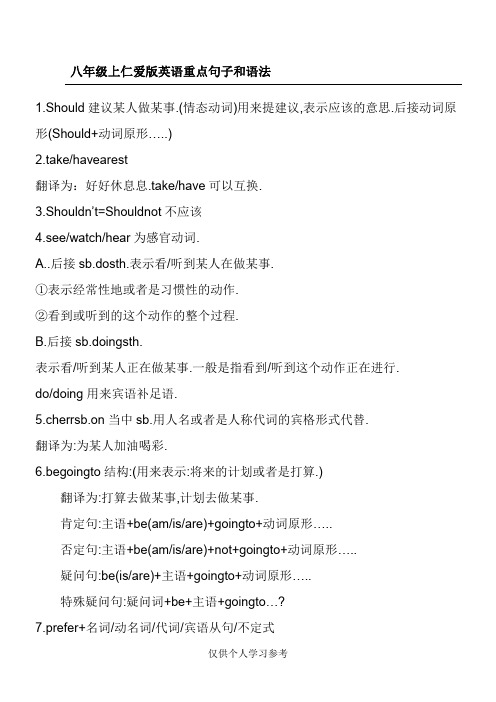
41.havefun/haveagoodtime/enjoyoneself翻译为:玩得愉快,开心
42.havefundoingsth./enjoydoingsth.翻译为:乐于做某事
43.fillout=fillin填写
fillsb.out填写……sb.为名词/人称代词的宾格形式
翻译为:为某人加油喝彩.
6.begoingto结构:(用来表示:将来的计划或者是打算.)
翻译为:打算去做某事,计划去做某事.
肯定句:主语+be(am/is/are)+goingto+动词原形…..
否定句:主语+be(am/is/are)+not+goingto+动词原形…..
疑问句:be(is/are)+主语+goingto+动词原形…..
31.belatefor来晚了;迟到
32.besorryfor+sth./doingsth.翻译为:为……而感到抱歉
33.beimportanttosb.翻译为:对某人说是重要的
34.quite+abit/alot表示频率后接of用来修饰名词
35.enjoydoingsth.喜欢做某事
36.start/begin+todosth./doingsth.翻译为:开始做某事
26.haveafight争吵;打架fight做名词讲
27.saysorrytosb.翻译为:向某人道歉sb.接名词/人称代词的宾格形式
28.withone’shelp/withthehelpofsb.翻译为:在某人的帮助下
29.keepsb.doingsth.翻译为:使某人一直做某事
英语初二上仁爱湘教版七—八上动词一些用法的形式归纳
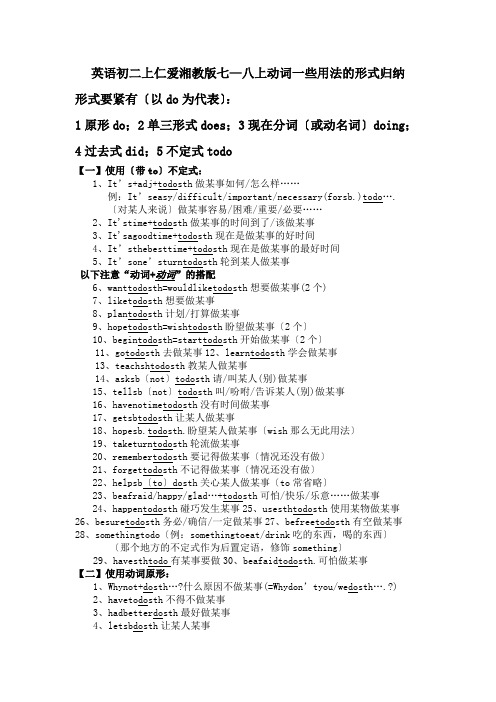
英语初二上仁爱湘教版七—八上动词一些用法的形式归纳形式要紧有〔以do为代表〕:1原形do;2单三形式does;3现在分词〔或动名词〕doing;4过去式did;5不定式todo【一】使用〔带to〕不定式:1、It’s+adj+todosth做某事如何/怎么样……例:It’seasy/difficult/important/necessary(forsb.)todo….〔对某人来说〕做某事容易/困难/重要/必要……2、It'stime+todosth做某事的时间到了/该做某事3、It'sagoodtime+todosth现在是做某事的好时间4、It’sthebesttime+todosth现在是做某事的最好时间5、It’sone’sturntodosth轮到某人做某事以下注意“动词+动词”的搭配6、wanttodosth=wouldliketodosth想要做某事(2个)7、liketodosth想要做某事8、plantodosth计划/打算做某事9、hopetodosth=wishtodosth盼望做某事〔2个〕10、begintodosth=starttodosth开始做某事〔2个〕11、gotodosth去做某事12、learntodosth学会做某事13、teachshtodosth教某人做某事14、asksb〔not〕todosth请/叫某人(别)做某事15、tellsb〔not〕todosth叫/吩咐/告诉某人(别)做某事16、havenotimetodosth没有时间做某事17、getsbtodosth让某人做某事18、hopesb.todosth.盼望某人做某事〔wish那么无此用法〕19、taketurntodosth轮流做某事20、remembertodosth要记得做某事〔情况还没有做〕21、forgettodosth不记得做某事〔情况还没有做〕22、helpsb〔to〕dosth关心某人做某事〔to常省略〕23、beafraid/happy/glad…+todosth可怕/快乐/乐意……做某事24、happentodosth碰巧发生某事25、usesthtodosth使用某物做某事26、besuretodosth务必/确信/一定做某事27、befreetodosth有空做某事28、somethingtodo〔例:somethingtoeat/drink吃的东西,喝的东西〕〔那个地方的不定式作为后置定语,修饰something〕29、havesthtodo有某事要做30、beafaidtodosth.可怕做某事【二】使用动词原形:1、Whynot+dosth…?什么原因不做某事(=Whydon’tyou/wedosth….?)2、havetodosth不得不做某事3、hadbetterdosth最好做某事4、letsbdosth让某人某事5、makesb.(not)dosth.使/让某人〔别〕做某事5、情态动词〔can/could/must/would/may/should/might/hadbetter/haveto/(need)等〕之后动词用原形6.see/watch/hear/feelsb do sth.看到/听到/感受到某人做过某事【三】使用-ing形式1、介词+doingsth如:Whataboutdoingsth=Howaboutdoingsth做某事如何样?begoodatdoingsth,dowellindoingsth擅长于做某事It’stimefordoingsth.Thankyoufordoingsth.taketurnindoingsth轮流做某事2、bebusydoingsth忙于做某事3、goswimming/shopping/dancing/hiking/skating/skiing/climbing去游泳/购物/跳舞/远足/滑冰/滑雪/爬山……〔搭配较固定〕4、Therebe+名词+doingsth有正在做某事的……如:Thereisagirldancingintheroom.在房间里有一个正在跳舞的男孩。
仁爱英语八年级上语法规则知识点总结
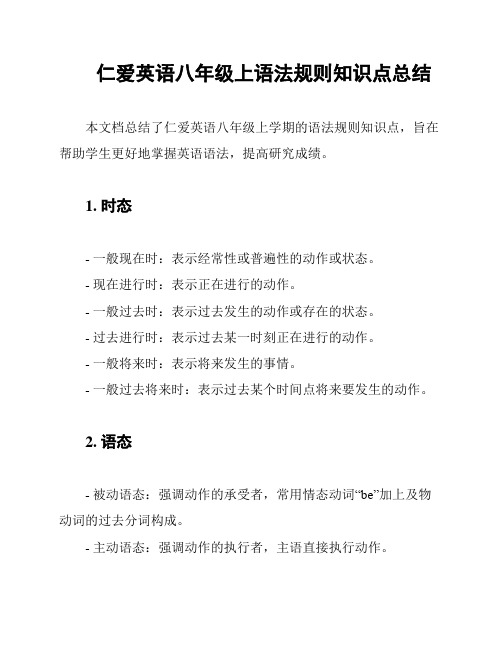
仁爱英语八年级上语法规则知识点总结本文档总结了仁爱英语八年级上学期的语法规则知识点,旨在帮助学生更好地掌握英语语法,提高研究成绩。
1. 时态- 一般现在时:表示经常性或普遍性的动作或状态。
- 现在进行时:表示正在进行的动作。
- 一般过去时:表示过去发生的动作或存在的状态。
- 过去进行时:表示过去某一时刻正在进行的动作。
- 一般将来时:表示将来发生的事情。
- 一般过去将来时:表示过去某个时间点将来要发生的动作。
2. 语态- 被动语态:强调动作的承受者,常用情态动词“be”加上及物动词的过去分词构成。
- 主动语态:强调动作的执行者,主语直接执行动作。
3. 宾语从句宾语从句是在主句中作宾语的从句,常用连词有:- that- whether- if- who- whom- whose- which- when- where- why4. 名词性从句名词性从句在句子中充当名词的角色,常见的名词性从句有:- 主语从句- 宾语从句- 表语从句- 同位语从句5. 状语从句状语从句在句子中充当状语的角色,常用的引导词有:- when- while- before- after- since- because- although- if- unless6. 直接引语和间接引语直接引语是将别人的话用原词引述出来,常用引号包围;间接引语是将别人的话转述出来,通常对原话进行变化。
7. 介词短语介词短语用来修饰名词、代词、动词、形容词、副词等,在句子中充当状语、定语等。
8. 冠词冠词分为不定冠词“a/an”和定冠词“the”,用来修饰名词、限定名词的范围。
9. 形容词和副词的比较级和最高级形容词和副词的比较级用于比较两个以上的人或事物的属性的程度。
10. 名词所有格名词所有格用来表示所属关系,通常在名词后面加上“'s”。
以上是仁爱英语八年级上学期的语法规则知识点总结,希望对同学们的英语学习有所帮助。
仁爱版英语八年级上册八上必背动词短语汇总(含语法)

仁爱版英语八年级上册八上必背动词短语汇总(含语法)仁爱版英语八年级上册八上必背动词短语汇总(含语法)表达喜好和意愿- Would like to (do something):愿意(做某事)- Prefer (to do something):更喜欢(做某事)- Enjoy (doing something):喜欢(做某事)- Love (doing something):爱(做某事)- Hate (doing something):讨厌(做某事)- Want (to do something):想要(做某事)- Hope (to do something):希望(做某事)表达能力- Be able to (do something):能够(做某事)- Can (do something):能够(做某事)- Could (do something):可以(做某事)- Know how to (do something):知道如何(做某事)- Have the ability to (do something):有能力(做某事)表达喜欢和不喜欢的程度- Really enjoy (doing something):非常喜欢(做某事)- Absolutely love (doing something):非常喜爱(做某事)- Quite like (doing something):相当喜欢(做某事)- Don't mind (doing something):不介意(做某事)- Dislike (doing something):不喜欢(做某事)- Really hate (doing something):非常讨厌(做某事)表达惯和经验- Used to (do something):过去常常(做某事)- Be used to (doing something):惯(做某事)- Get used to (doing something):逐渐惯(做某事)- Have experience in (doing something):有经验(做某事)- Be good at (doing something):擅长(做某事)表达意图和目的- Intend (to do something):打算(做某事)- Plan (to do something):计划(做某事)- Aim (to do something):打算(做某事)- Purpose (to do something):目的(做某事)表达允诺和建议- Promise (to do something):承诺(做某事)- Agree (to do something):同意(做某事)- Suggest (doing something):建议(做某事)- Advise (doing something):劝告(做某事)表达兴趣和态度- Be interested in (doing something):对(做某事)感兴趣- Be excited about (doing something):对(做某事)感到兴奋- Be worried about (doing something):对(做某事)感到担忧- Be surprised at (doing something):对(做某事)感到惊讶表达情感和感受- Feel like (doing something):有想要(做某事)的感觉- Look forward to (doing something):期待(做某事)- Be happy about (doing something):为(做某事)感到高兴- Be sad about (doing something):为(做某事)感到伤心以上是仁爱版英语八年级上册八上必背动词短语汇总的内容。
仁爱版八年级英语上册Unit1知识点详解归纳
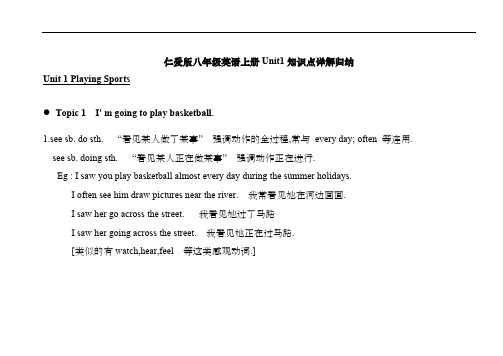
我打算本周日和同学们一起打篮球。 She is going to buy a sweater for her mother.
她打算为她妈妈买一件毛衣。 What are you going to be when you grow up?你长大后想成为什么? What are you going to do when you grow up?你长大后想做什么? ②表预测。指根据迹象推测,而且马上或很快就要发生。
I’m sorry I lost your book. = I’m sorry to lose your book.很抱歉弄丢你的书。
8. tired adj. “(感到)疲惫的” , 主语是人
如: I feel tired today. 今天我感到累了.
tiring adj. “令人疲劳的”, 主语是事物
10.wish sb. to do sth. wish that 从句
hope to do sth.
hope that 从句
重点短语:cheer on 为某人加油(人称代词放中间)play for 效力于…play against 和某人比赛 +时间 in doing sth.花费时间做某事 be good at=do well in 擅长做某事 keep fit=keep healthy 保持健康
(完整版)仁爱版八年级上册英语知识点汇总(完整版)

八年级上学期英语知识点八年级英语短语总汇Unit1 Topic11.be going to do 打算做某事2.See sb do sth看见某人做某事(全过程)See sb doing sth看见某人正在做某事(正在进行)3.cheer sb on为...加油4.Play against=fight against 与...对抗/大战5.Be against--Be for 反对—赞同6.practice+doing 练习做...7.Prefer+doing 跟喜欢...Prefer doing to doing 或比起做后者,更喜欢做前者Perfer to do, quite a lot/bit/often.Which one do you prefer, which kind of that?10. Join+某人/组织Join in+活动/比赛加入Take part in+活动/比赛Be in+活动/比赛13.Know about... 知道/了解有关于...当时间来临时,我们将采取行动;这是我们的计划。
15. It takes sb+时间/钱 to do sthSpend+时间/钱+(in) doing sth 在某方面花费多少Spend+时间/钱+on+n.物+cost+时间/钱16.There be going to be=there will be 这里将会有...17.Be good at+(doing)sth=Do well in+(doing)sth 擅长做...18.Be sure that+宾语从句确信... 19.Be sure to do 肯定要做...20.Be sure of/about 对...有把握 21.At the weekend 在周末22.Make sb/sth+adj 使...处在什么状态23.Keep+adj 保持...;keep sb/sth+adj 使...保持什么状态24.A way to 一种...的方法 25.Relax oneself 使某人自己放松26.Play for 为...效力27.Arrive in=get to=reach+大地方;Arrive at+小地方28.Excited(人);exciting(物)29.Leave for动身做某地;leave A for B 离开A地去B地Unit1 Topic21.Could you(not)....=cuold/would you please(not)do=would/do youmind(not)doing=Would you mind (not)+if+从句2.fall ill=be ill 生病其中之一是n的复数形式.优化后的文本可以是:Use 'keep doing' for continuous action and 'keep on doing' for repeated action with intervals.5.Help sb.=give sb a hand 帮助某人6.V.+间宾(人)+直宾(物)=V.+直宾+to/for+间宾7.Sure=certainly=of course 当然8.Not at all=certainly not=of course not 不介意9.Never mind=it’s nothing=it’s doesn’t matter 没关系乱扔11.Adj.修饰不定代词放其后12.Be sorry for/about.... 对...感到内疚13.What do you mean by...?=what does...mean?=what’s the meaning of...?意思是什么?14.Shout at sb. 斥责某人15.Do/try one’s best to do sth 尽某人做大的努力做某事16.Be angry with sb. For doing sth 因为某人做某事而生气17.be angry at/about sth 因某事而生气18.be angry with 因...而生气19.With the help of sb.=with one’help 在某人的帮助下20.Say...to sb. 对某人说...e into being=be born 形成/产生22.So...that... 如此...以致...=to...too... 太...而不能...23.A century=one hundred year 一个世纪24.Over=more than 超过25.Through(中间)=aross(表面) 通过阻止他们从做28.It’s + adj +(for sb.)+to do (对某人来说)做...是...29.Another+基数词又一,在一; other +n.复数另外的Around=all_over 处到处31.Just for...只是为了...32.Turn...into... 使...变成...33.Sit around 围坐在34.Get from doing 得到...35.Such as 后不可列出前面所提过的所有东西36.A number of+n.可数复数许多的;the number of+n.单数 ...的数量37.Hero 复数(Pl.) heroesUnit1 Topic31.连字符后不加soman则例外,需用复数。
仁爱版八年级上册英语知识点整理

仁爱版八年级上册英语知识点整理八年级上册英语知识点整理U1T11、Be going to do sth.(后面加动词原形,表示按计划或安排要发生的动作,意为“准备;打算”,也表示推测将要或肯定会发生的动作)否定句:be not going to do sth.疑问句:be sb. going to do sth.?特殊疑问句:疑问词+be+sb. going to do sth.?2、see sb. do sth.看见某人做某事,强调看见事情的全过程或事情的经常性、重复性发生see sb. doing sth. 看见某人正在做某事,强调动作正在进行。
类似单词watch,hear等3、cheer sb. on为……加油,向……欢呼(宾语放在中间)cheer sb. up(使)……振作/高兴起来(宾语放在中间)4、practice sth.练习某事practice doing sth.练习做某事5、prefer(过去式preferred,现在分词preferring)=like better用法:(1)prefer sth.更喜欢某物(2)prefer A to B 相对于B更喜欢A(3)prefer doing sth. 更喜欢做某事(4)prefer doing A to doing B相对于做B事喜欢做A事6、join & join inJoin:后加团队,组织,俱乐部Join in=take part in=be in:后加活动7、wish & hopewish(1)wish+从句(2)wish to do sth.希望做某事(3)wish sb. to do sth.希望某人做某事hope(1)hope +that从句(2)hope to do sth.希望做某事8、a bit=a little有一点,修饰形容词a bit of+不可数名词=a little+不可数名词quite a bit/a little=quite a lot相当多地9、句式:主语+be+数词+量词+形容词Eg.He is 2.26 meters tall.10、(1)play for为……效力(2)play against与……比赛(3) play with 玩某物/与某人玩11、dream of/about(doing)sth.梦见……12、grow(过去式grew)(1)做“生长”讲,不及物动词Eg:The flowers grow very well.(2)做“种植”讲,及物动词Eg:I grow some flowers in my garden.13、spend & cost & takeSpend(人做主语)花费时间和金钱Sb. spend…in some place某人在某地度过多长时间S b. spend…(in) doing sth.某人花费时间或金钱做某事Sb. spend…on sth.某人在某事上花费金钱或时间Sth. cost sb. some money某物花费某人多少钱Take(it做主语)花费时间It takes sb. some time to do sth.做某事花费某人多长时间14、be good/bad for…对……有益处/害处15、exercise n.锻炼,做操,练习,习题v.锻炼do exercise 做运动、做锻炼do eye exercises 做眼保健操(分节时exercise加-s)do morning exercises 做早操16、be good at 擅长于…的be good at sth.=do well in sth.擅长某事be good at doing sth.=do well in doing sth.擅长做某事17、keep healthy= keep fit 保持健康18、make & keepMake(1)make+宾语+adj.“使…保持…”Eg: You make me happy.(2)make+宾语+n.Eg: We made him monitor.(3)make+宾语+do sth.=ask+宾语+to do sth.Eg: My mom makes me clean the room.=My mom asks me to clean the room.(4)make+宾语doing sth,使某人一直做某事Keep(1)keep+adj.Eg:Keep quiet.(2)keep+宾语+adj“使…保持….”Eg:These gloves will keep your hands warm.(3)keep doing sth. 一直做某事(4)keep sb. from doing sth.阻止某人做某事(5)keep a pet 养一个宠物19、be popular with sb.对某人来说很受欢迎(受到某人的喜爱)20、arrive in+大地点(城市、国家……)到达……arrive at+小地点(乡村、车站……Attention:飞机场是小地点)到达……Attention:arrive,get 后可直接加地点副词21、leave 离开(过去式为left)leave (A) for B (从A处)动身前往B地Attention:leave是趋向动词,常用现在进行时表将来,类似动词还有:come,go,arrive,stay等Leave还可以当“把……留下”22、excited人感到兴奋的exciting (物)令人感到兴奋的类似的词还有:interested---interesting relaxed---relaxingbored---boring surprised---surprisingshocked---shocking tired---tiring等等23、a number of+可数名词复数=many+可数名词复数“大量的,许多的”谓语动词用复数The number of+可数名词复数,“…的数量”,谓语动词用单数U1T21、One of+可数名词复数,表示“……其中之一”,其谓语动词用单数2、fall ill生病,得病(fall为系动词,后面加形容词)be ill & fall illfall ill强调动作,短暂性动词词组,不能和“for+时间段”连用be ill强调状态,是持续性行为,可以和“for+时间段”连用3、be glad to do sth.乐意做某事4、句式:Would you mind (not)+v.-ing+其它?回答:I am sorry… /I’d afraid you’d better not.(委婉拒绝)Certainly not./Of course not./No, not at all./Never mind.(赞同和接受对方建议) 其它用法:(1)Would you mind+形容词性物主代词/宾格+doing sth.Eg: Would you mind my/me smoking here?(2)Would you mind +if 从句?Eg:Would you mind if I smoke ?=Would you mind my smoking?5、双宾语结构:kick sth. to sb.=kick sb. sth.把某物体给某人pass sth. to sb.=pass sb. sth.把某物传给某人6、shout to sb.冲某人高声喊shout at sb.冲某人(生气地)叫喊,有骂的含义7、have a fight(n.) with sb.=fight(v.) with sb.与某人争论或打架Attention:fight for sth.为……而奋斗fight against…与……作斗争(争吵)8、do one’s best=try one’s best尽某人最大努力do one’s best to do sth.尽某人最大努力去做某事9、be angry with sb.因某人而生气be angry with sb. for sth. 因某人做了某事而生气be angry at/about sth.因某事而生气10、be sorry for/about (doing) sth.因(做了)某事而感到抱歉11、have fun (in ) doing sth.在做某事中获得了极大乐趣12、be sure that +从句,表示确信……如果sure后面的主语和前面的主语是同一个,就用“be sure to do sth.如果不是同一个主语就用“be sure that……”补充:be sure of/about……对…确信/肯定/有把握,后面可以是名词或代词13、(1)at first起初,一开始First of all首先,尤为重要的是(反义词组at last)(2)so that…(引导目的状语从句)“为了…,以便于…”& so+adj./adv.+that…(引导结果状语从句)“如此…以至于…”拓展:too…to…“太…以至于不能…”not …enough to “不足够…做某事”14、throw…through…“扔…穿过…”15、throw…away扔掉,抛弃throw…around(about)乱扔throw…into把…扔进…throw…out of…把…抛出去16、stop sb. (from) doing sth.=prevent…(from)doing sth.=keep…from doing sth.阻止某人做某事for example+句子,前为句号,后有逗号,可放在句首、句中、句末such as+名词或名词性短语,放在被列举的事物与前面的名词之间,前为逗号,后没有逗号18、(1)some of+[C]复数/宾格人称代词复数,谓语动词用复数,意为“…其中一些…(2)some of+[U],谓语动词用单数拓展:many of+可数名词复数,“…中的很多(人或事)”much of+不可数名词“…中的很多”19、turn… into…将…变成…Turn & get & becomeTurn,指性质、品质、状态、颜色放生变化,后面加形容词或名词turn A into B“把A变成B”Get,多用于口语,表示一种变化过程,强调“渐渐变得”,后面加形容词的比较级Become,多指身份、职位等的变化,强调变化的结果,后面加形容词20、用v.-ing表示伴随状语,前后两句中间有逗号21、hit one’s h ead=hit sb. on the head打某人的头22、be+v.-过去分词,表示被动23、by(prep.)+doing sth. 通过某种方式去做某事24、be angry at/about sth.对于某事很生气1、Sb. do sth. for the first time.=It’s the first time for sb. to do sth.=It’s one’s first time to do sth.这是某人第一次去做某事2、Let’s make(约定) it half past six.Attention:这里的时间前不加at3、a symbol of(名词词组),“…的标志”Stand for(动词词组),“代表,象征”4、each+可数名词单数,“每一个”5、Every:①every+可数名词单数②句式:every+基数词+名词复数Eg: every four years“每四年,每隔三年”every three days“每三天,每隔两天”6、have the chance to do sth.有机会去做某事7、one day 有一天,可用在将来时,也可以是过去时the other day 不久前的一天,用于一般过去时8、be able to do sth.(可用于各种时态)=can do sth.(只有一般现在时和一般过去时)“能够做某事”9、with the help of sb. =with one’s help 在某人的帮助下10、be going to & will & shall(一般将来时)a)be going to+动词原形①表示打算、近期要做的事情②有迹象表明即将发生的事b)will+动词原形①表示带意愿色彩的将来或客气的邀请或命令时②表示说话人认为某事会发生③客观事情的发生与主观愿望或判断无关c)shall+动词原形,主语为第一人称①表示未来的事实或对将来的预测②表示带意愿色彩的将来或客气的邀请或命令时d)be+v.-ing表示将来(位移动词):start/leave/fly/move/go/stay/come/arrive等11、for the first time“首次,第一次”在句子中做时间状语12、make friends交朋友make friends with sb. 与……交朋友1、well:①adj.表示身体好的,健康的②adv.好地2、What’s wrong with sb.?=What happened to sb.?某人怎么了?3、have a headache/toothache/backache/stomachache/fever头疼/牙疼/背疼/胃疼/发烧have the flu 患流感严重的病可用terrible或bad来修饰4、I’m sorry+动词不定式,或I’m sorry +that 从句表示对所做错事的一种歉意或听到不好消息时的委婉表达5、should,情态动词,常用来建议或告诫别人该做什么不该做什么,后面加动词原形(否定形式:shouldn’t)6、had better do sth.最好做某事had better not do sth.最好不要做某事7、现在完成时句子基本构成:have/has+动词的过去分词(have和has是助动词,无意义)8、take sb. to sp.带某人去某地9、have a rest=take a rest休息一下10、suggest=advise建议(v.)suggest sb.(not) to do sth.advise sb. (not) to do sth. 建议某人(不要)去做某事suggestion(可数)=advice(不可数)建议(n.)一条建议a piece of advice两条建议two pieces of advice11、take pills(pill,可数,专指药丸)take medicine(medicine,不可数,泛指药)Attention:吃药不能用have和eat12、feel like(介词) doing sth.=want to do sth.=would like to do sth. 想要做某事13、nothing,something,anything等不定代词碑形容词修饰时,形容词放其后14、while & when(引导时间状语从句)当……时候While:①动词必须是延续性动词②从句和主句的动作同时发生,两句都用过去进行时③强调主句的动作在从句的动作发生过程中When:①动词可以是短暂性动词,也可以是延续性动词②主句用过去进行时,从句一般用一般过去时③从句和主句的动作可以同时发生,也可以先后发生15、need:①sb. need sth.“某人需要某物”②sb. need to do sth.“某人需要做某事”③sth. need doing sth.=sth. need to be+过去分词“某物需要被…”Attention:在否定句种和疑问句中need为情态动词16、run to sb.向某人跑去run into sb.撞到某人17、hurt:vt.使伤心,伤害(强调动作)vi.受伤,受疼痛(强调状态)adj.受伤的,痛的18、check over=look over仔细检查(代词放中间Eg:check me over)19、help sb. (to) do sth.帮助某人做某事help sb. with sth.20、ask:请两天的假:ask for two days’ leave =ask for two-day leaveask for help请求,恳求ask sb. for help向某人求救(call sb. for help向某人打电话求救)21、return to=go back to返回…(当地点为地点副词时,去掉to)22、too much+不可数名词“太多…”much too+形容词“太…”too many+可数名词复数too much 放在动词后,表示“做某事太多次”23、thanks/thank you for sth./doing sth.因为(做)某事而感谢某人24、接受建议:follow(take)the advice25、worry & worriedSb. worry about sth.(强调担心的动作)Sb. be worried about sth.(强调担心的状态)26、for+时间段,回答由“How long”引导的问句27、take:take medicine(pills)吃药take the temperature 量体温take…to…带某人或某物去某地take away 带走take off 脱下,起飞take…with…随身携带某物U2T21、动名词做主语,谓语动词用单数2、Because(conj.):后面加句子Cause(v.):后面加宾语3、without(prep.)后面加名词、代词、动名词4、must:①情态动词,后面加动词原形②在肯定句中,表示肯定推测,可能性最大③引导一般疑问句,答语:Yes,主语+must.No,主语+needn’t或don’t have to.拓展:表示推测:肯定:must>can>could>may>mightMust语气最强烈,“一定”can理论上可能,但未必会发生,“可能”could再次“can”,“可能”may/might无把握的推测,“也许,可能”(might比may更没有把握)否定:can’t>couldn’t>may not>might notcan’t,语气最强烈,“一定不“couldn’t,比can’t语气弱,表示某事不一定真实,“可能不”may not和might not(无把握的)否定推测,“或许不”用于疑问句的推测,一般只用can和could5、say表示电话、报纸、广播、布告、电视上说,不一定能真正意义上说出声,但表达传递出了一定的内容6、even adv.通常置于所修饰词之前,若有助动词放助动词后,还可修饰比较级(还有alot,much,a little)7、ask sb.(not) to do sth.要求某人(不要)做某事tell sb.(not) to do sth.告诉某人(不要)做某事8、give up:①后加宾语(名词、代词、动名词)②加代词作宾语,宾语放中间(give it up)9、enough:①adj. “充分的,足够的”,加名词②adv.“充分地,足够地”,修饰形容词和副词,放其后③n. “足够”10、主过从过:主句用过去时,宾语从句也用过去时Eg: She said it might cause illness.主将从现:主句用将来时,状语从句用一般现在时表将来Eg: If it doesn’t ra in tomorrow, I will play soccer.as soon as “…就马上…”引导时间状语从句,此句型“主将从现”Eg: I will call you as soon as I get to Beijing.11、照顾好某人:①care for sb. very well.②look after sb. very well.③take good care of sb.12、强迫某人(不要)做某事Force sb. (not) to do sth.13、感官动词:taste sound feel look smell尝起来,听起来,感觉起来,看起来,闻起来(感官动词后面加形容词)14、Could & maycould:①can的过去式②在疑问句中表示委婉请求may:①表推测,可能,用于肯定句中②表请求、许可,意为“可以”,可和“can”互换(表请求时用于第一人称的一般疑问句时,否定回答用mustn’t或can’t)③表祝愿15、do harm to sb.对某人有害16、not only…but(also)…不仅…而且…,并列两个对等的句子成分。
仁爱版八年级上册重点动词和句型汇总
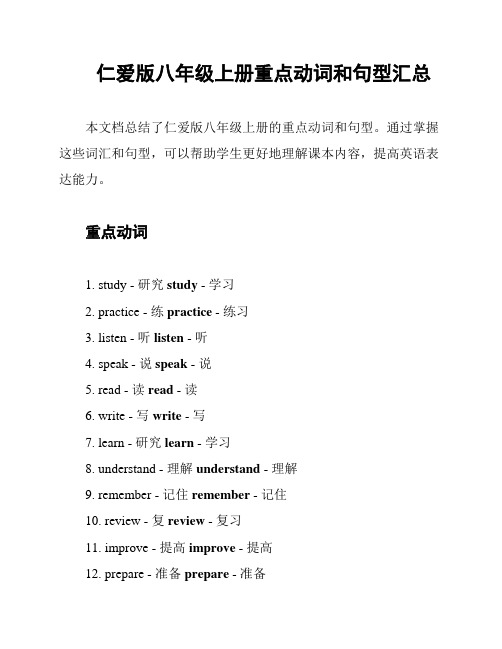
仁爱版八年级上册重点动词和句型汇总本文档总结了仁爱版八年级上册的重点动词和句型。
通过掌握这些词汇和句型,可以帮助学生更好地理解课本内容,提高英语表达能力。
重点动词1. study - 研究study - 学习2. practice - 练practice - 练习3. listen - 听listen - 听4. speak - 说speak - 说5. read - 读read - 读6. write - 写write - 写7. learn - 研究learn - 学习8. understand - 理解understand - 理解9. remember - 记住remember - 记住10. review - 复review - 复习11. improve - 提高improve - 提高12. prepare - 准备prepare - 准备13. answer - 回答answer - 回答14. ask - 问ask - 问15. watch - 观看watch - 观看16. enjoy - 喜欢enjoy - 喜欢17. finish - 完成finish - 完成18. start - 开始start - 开始19. try - 尝试try - 尝试20. practice - 练practice - 练习重点句型1. Can you help me? - 你可以帮助我吗?Can you help me? - 你可以帮助我吗?2. What's your favorite subject? - 你最喜欢的科目是什么?What's your favorite subject? - 你最喜欢的科目是什么?3. I'm good at English. - 我擅长英语。
I'm good at English. - 我擅长英语。
4. I need some help. - 我需要一些帮助。
仁爱英语八年级上册语言点、语法总结归纳
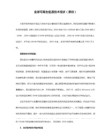
八年级上学期期末复习资料Unit One语法:一般将来时结构:be (am/ is /are)going to do sth. 表示计划、打算或安排搭配词:tomorrow;the day after tomorrow;tomorrow morning/...next week/month/Friday/...this morning/afternoon/evening/week/term/...; tonightin a week => in + 一段时间; 注意划线的提问词用how soonin the futurefour days later => 一段时间+ latersb. hope/wish + 宾语从句(将来时)e.g. Our Chinese teacher is going to give (give)a speech this Friday.否定句:Our Chinese teacher isn't going to give a speech this Friday.一般疑问句:Is our Chinese teacher going to give a speech this Friday?肯定回答:Yes, he is.否定回答:No,he isn't.画线提问:When is he going to give a speech?Topic 11.see sb. do sth. “看到某人做了某事(强调过程,经常发生)”see sb. doing sth.“看到某人在做某事(强调瞬间,偶尔发生)”类似用法的动词还有:find; watch; hear;noticee.g. We just found Tom reading a book in his study.Mr. Green often hears the little girl play the piano.2.during(介词) the summer holidaysp.s. 介词后跟动词,动词应加ing。
- 1、下载文档前请自行甄别文档内容的完整性,平台不提供额外的编辑、内容补充、找答案等附加服务。
- 2、"仅部分预览"的文档,不可在线预览部分如存在完整性等问题,可反馈申请退款(可完整预览的文档不适用该条件!)。
- 3、如文档侵犯您的权益,请联系客服反馈,我们会尽快为您处理(人工客服工作时间:9:00-18:30)。
仁爱版英语七--八上册动词一些用法的形式归纳
形式主要有(以do为代表):
1 原形do;2单三形式does;3 现在分词(或动名词)doing;4过去式did;5不定式to do
一、使用(带to)不定式:
1、It’s + adj + to do sth 做某事如何/怎样……
例:It’s easy/difficult/important/necessary(for sb.) to do….
(对某人来说)做某事容易/困难/重要/必要(客观事实类形容词)……
区别:It’s careless, clever, good, foolish, honest, kind, lazy, nice, right, silly, stupid, wise(of sb)to do sth
(对某人来说)做某事粗心/聪明/好的/蠢的……(对人评价的形容词)
2、It's time + to do sth 做某事的时间到了/该做某事
3、It's a good time + to do sth 现在是做某事的好时间
4、It’s the best time + to do sth 现在是做某事的最好
时间
5、It’ s one’s turn to do sth 轮到某人做某事
以下注意“动词+to do ”的搭配
6、want to do sth = would like to do sth 想要做某事(2个)
7、like to do sth 想要做某事
8、plan to do sth 计划/ 打算做某事
9、hope to do sth = wish to do sth 希望做某事(2个)
10、begin to do sth = start to do sth 开始做某事(2个)
11、go to do sth 去做某事12、learn to do sth学会做某事
13、teach sh to do sth 教某人做某事
14、ask sb (not)to do sth 请/叫某人(别)做某事
15、tell sb (not)to do sth 叫/吩咐/告诉某人(别)做某事
16、have no time to do sth 没有时间做某事
17、get sb to do sth 让某人做某事
18、hope sb. to do sth. 希望某人做某事(wish则无此用法)
19、take turns to do sth 轮流做某事
20、remember to do sth 要记得做某事(事情还没有做)
21、forget to do sth 忘记做某事(事情还没有做)
22、help sb (to)do sth帮助某人做某事(to常省略)
23、be afraid/happy/glad… + to do sth 害怕/高兴/乐意……做某
事
24、happen to do sth碰巧发生某事
25、use sth to do sth使用某物做某事
26、be sure to do sth务必/肯定/一定做某事
27、be free to do sth有空做某事
28、something to do(例:something to eat/drink 吃的东西,喝的东西)
(这里的不定式作为后置定语,修饰something)
29、have sth to do 有某事要做
30、be afaid to do sth.害怕做某事
二、使用动词原形+do:
1、Why not + do sth …? 为什么不做某事
(=Why don’t you/we do sth….?)
2、have to do sth 不得不做某事
3、had better do sth 最好做某事
4、let sb do sth 让某人某事
5、make sb. (not )do sth. 使/让某人(别)做某事
5、情态动词(can/ could/must/would/may/should/might/had better/have
to/(need)等)之后动词用原形
6. see/watch/hear/feel sb do sth. 看到/听到/感觉到某人做过某事
三、使用-ing 形式
1、介词+ doing sth
①What about doing sth = How about doing sth 做某事怎么样?
②be good at doing sth=do well in doing sth 擅长于做某事
③It’s time for doing sth. 该做某事了
④Thank you for doing sth. 因做某事而感谢某人
⑤take turns in doing sth 轮流做某事
2、be busy doing sth 忙于做某事
3 go swimming/shopping/dancing/hiking/skating/skiing/climbing
去游泳/购物/跳舞/远足/滑冰/滑雪/爬山……(搭配较固定)
4、There be +名词+doing sth 有正在做某事的……
如:There is a girl dancing in the room. 在房间里有一个正在跳舞的男孩。
1 / 2
5、enjoy doing sth 喜欢做某事
6、finish doing sth 已完成做某事
7、keep doing sth. 继续/持续做某事
8、keep sb. doing sth. 让某人一直做某事
9、hate doing sth. 讨厌/憎恨做某事
10、feel like doing sth. 感觉想做某事
11、give up doing sth. 放弃/停止做某事,戒掉……
12、practice doing sth. 练习做……
13、prefer doing sth. 更喜欢做某事(prefer to do sth宁愿做某事)
14、Would you mind (not) doing sth….?
请你做……,好么?/你不介意做……吧?
Would you mind (one’s) doing sth….? (某人)做……你介意么?
15、hear/see/watch sb doing sth 听到/看到某人正在做某事
16、remember doing sth 记得曾经做过某事(事情已经做过)
17、forget doing sth 忘记曾经做过某事(事情已经做过)
18、Doing sth is + 形容词…做某事如何……
例:Getting up early is good for health.
特别注意以上用法中
A.既用doing也用动词不定式to do且意思差别不大:
like doing sth./to do sth. 喜欢做某事
begin/start doing sth./to do sth. 开始做某事
B. 既用ing也用to动词不定式且意思不同:
1. remember doing sth. )
remember to do sth. 记得做某事(未做)
2.see /watch/hear/feel sb doing 看到/听到/感觉到某人正在做某事
see/watch/hear/feel sb do sth. 看到/听到/感觉到某人做过某事
3. stop doing sth. 停止做(手头正做的)某事
stop to do sth. 停下来做(别的)某事
4. go on doing sth. 继续做(原来)的某事
go on to do sth. 继续做(别的)某事
附录★某些特定的动词后面接ving作宾语---顺口溜Avoid, miss, put off 避免错过少延期
Advise, finish, practice 建议完成多练习
Enjoy, imagine, can’t help 喜欢想象禁不住
Admit, deny, envy,承认否定与嫉妒
Escape, risk, excuse 逃避冒险莫原谅
Allow/permit appreciate consider 允许感激和考虑
Understand ,encourage ,forbid 明白鼓励要禁止
友情提示:范文可能无法思考和涵盖全面,供参考!最好找专业人士起草或审核后使用,感谢您的下载!。
